Collection
Special Issue: Fish Movement - Molecules, Models and Migration
- Submission status
- Closed
Editors
-
Peter Klimley
Dr. A. Peter Klimley has studied animal behavior for over four decades. He received a MS in oceanography from the Rosenstiel School of Marine and Atmospheric Science at the University of Miami, Florida, and a PhD in marine biology from Scripps Institution of Oceanography of the University of California, San Diego. He has just retired from the positions of Director of the Biotelemetry Laboratory and Adjunct Professor in the Department of Wildlife, Fish, and Conservation Biology at the University of California, Davis, where he served as mentor of many graduate students in Animal Behavior, Ecology, and Geography Graduate Groups.
-
Karen Cogliati
Dr. Karen Cogliati received a MSc in Biological Sciences from the University of Windsor and a PhD in Psychology, Neuroscience & Behaviour from McMaster University. After her graduate work, she was a Research Associate in the Department of Fisheries and Wildlife at Oregon State University focusing on altering hatchery conditions to produce juvenile salmon with more wild-like characteristics, spanning basic and applied research in the fields of life history evolution, behavior, genetics, physiology, and morphology. Since 2019, she has been working as a science advisor for fisheries with Fisheries and Oceans Canada.
-
Mari Kuroki
Dr. Mari Kuroki studies the life history and evolution of migratory fishes. She specializes in early life history, migratory diversity, and conservation of eels. She also focuses on ocean science education and has published many books such as "Eels on the Move" and "Eels and Humans," and created picture books for children, educational web contents, and academic exhibitions. She is currently an Associate Professor at the University of Tokyo, Japan.
-
David Noakes
Dr. David Noakes, Editor-in-Chief of Environ Biol Fish and Editor for the series Fish & Fisheries at the time of his death in December 2021, was a specialist in fish ecology, behavior, and fish and wildlife conservation and management. He earned an MSc at the Univ of Western Ontario and a PhD from the Univ. of California, Berkley. He was a professor at the Univ. of Guelph, before moving to Oregon State University. He helped plan this special issue on “Fish Movement: Molecules, Models and Migration”.
Photo from the David L.G. Noakes Papers, Special Collections and Archives Research Center, Oregon State University Libraries.
Articles (33 in this collection)
-
-
Influence of water temperature on thyroid hormones and on the movement behavior of juvenile rainbow trout (Oncorhynchus mykiss) in water flow
Authors (first, second and last of 4)
- Dmitry S. Pavlov
- Efim D. Pavlov
- Ekaterina V. Ganzha
- Content type: OriginalPaper
- Published: 07 September 2022
- Pages: 1989 - 2000
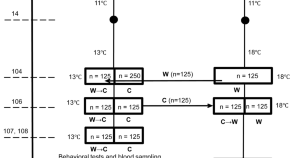
-
Annual and diel activity cycles of a northern population of the large migratory cyprinid fish asp (Leuciscus aspius)
Authors (first, second and last of 7)
- Einar Kärgenberg
- Odd Terje Sandlund
- Meelis Tambets
- Content type: OriginalPaper
- Published: 15 July 2022
- Pages: 1697 - 1711

-
Quantifying the effects of tides, river flow, and barriers on movements of Chinook Salmon smolts at junctions in the Sacramento – San Joaquin River Delta using multistate models
Authors (first, second and last of 4)
- Michael J. Dodrill
- Russell W. Perry
- Xiaochun Wang
- Content type: OriginalPaper
- Published: 31 May 2022
- Pages: 2065 - 2082

-
Influence of study design and movement behavior on performance of open population spatial Cormack-Jolly-Seber models: application to acoustic telemetry technology
Authors
- Jason L. Fischer
- Travis O. Brenden
- Lucas R. Nathan
- Content type: OriginalPaper
- Published: 28 May 2022
- Pages: 2027 - 2043
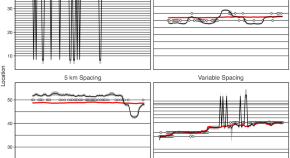
-
Anthropogenic structures influence small-fish movement in wetlands
Authors (first, second and last of 4)
- J. Matthew Hoch
- Eric R. Sokol
- Joel C. Trexler
- Content type: OriginalPaper
- Published: 14 May 2022
- Pages: 1933 - 1952
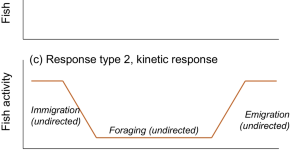
-
Tidal and diel effects on the movement and space use of bull sharks (Carcharhinus leucas) and bonnetheads (Sphyrna tiburo) in a Florida Estuary
Authors (first, second and last of 4)
- Ashley M. Dawdy
- Cheston T. Peterson
- R. Dean Grubbs
- Content type: OriginalPaper
- Published: 07 May 2022
- Pages: 1713 - 1727

-
Movement ecology of the white seabream Diplodus sargus across its life cycle: a review
Authors (first, second and last of 5)
- Vincenzo Maximiliano Giacalone
- Carlo Pipitone
- Giovanni D’Anna
- Content type: ReviewPaper
- Open Access
- Published: 25 April 2022
- Pages: 1809 - 1823

-
Movement patterns of juvenile green sturgeon (Acipenser medirostris) in the San Francisco Bay Estuary
Authors (first, second and last of 7)
- Michael J. Thomas
- Andrew L. Rypel
- Nann A. Fangue
- Content type: OriginalPaper
- Open Access
- Published: 13 April 2022
- Pages: 1749 - 1763
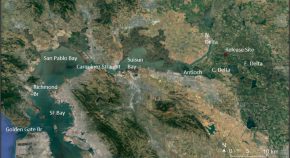
-
A new element in the migration cycle of the European river lamprey Lampetra fluviatilis: downstream migration from a lake
Authors (first, second and last of 4)
- Aleksandr V. Kucheryavyy
- Aleksandr O. Zvezdin
- Dmitry S. Pavlov
- Content type: OriginalPaper
- Published: 09 April 2022
- Pages: 1857 - 1871
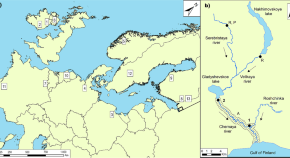
-
Correction to: Studies of the movement ecology of sharks justify the existence and expansion of marine protected areas in the Eastern Pacific Ocean
Authors (first, second and last of 17)
- A. Peter Klimley
- Randall Arauz
- César Peñaherrera-Palma
- Content type: Correction
- Published: 25 March 2022
- Pages: 2155 - 2156
-
Movement patterns and residency of bull sharks, Carcharhinus leucas, in a marine protected area of the Gulf of California
Authors (first, second and last of 5)
- Frida Lara-Lizardi
- E. Mauricio Hoyos-Padilla
- James T. Ketchum
- Content type: ReviewPaper
- Published: 17 March 2022
- Pages: 1765 - 1779

-
The migration of four salmonid species through fish bypass channels depending on environmental factors
Authors (first, second and last of 5)
- Tobias Epple
- Arne Friedmann
- Gernot Müller
- Content type: OriginalPaper
- Published: 03 March 2022
- Pages: 2099 - 2117

-
Acoustic zone monitoring to quantify fine-scale movements of aquatic animals in a narrow water body
Authors (first, second and last of 8)
- Hiromichi Mitamura
- Toshihiro Wada
- Nobuaki Arai
- Content type: OriginalPaper
- Published: 06 February 2022
- Pages: 1919 - 1931

-
Correction to: Lifetime‑scale ontogenetic movement and diets of red grouper inferred using a combination of instantaneous and archival methods
Authors
- Julie L. Vecchio
- Ernst B. Peebles
- Content type: Correction
- Published: 03 February 2022
- Pages: 1907 - 1907
-
Local fisheries conservation and management works: implications of migrations and site fidelity of Arapaima in the Lower Amazon
Authors (first, second and last of 4)
- Daniel J. Gurdak
- Donald J. Stewart
- Mike Thomas
- Content type: OriginalPaper
- Published: 03 February 2022
- Pages: 2119 - 2132
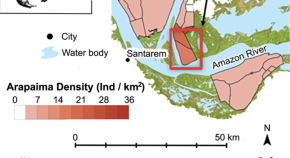
-
Winter migratory pattern for anadromous white-spotted char (Salvelinus leucomaenis) in southwestern Hokkaido, Japan
Authors
- Mitsuki Kuroda
- Kazushi Miyashita
- Content type: OriginalPaper
- Published: 01 February 2022
- Pages: 1845 - 1855

-
Cool runnings: behavioural plasticity and the realised thermal niche of basking sharks
Authors (first, second and last of 6)
- E. M. Johnston
- J. D. R. Houghton
- P. J. Mensink
- Content type: OriginalPaper
- Open Access
- Published: 29 January 2022
- Pages: 2001 - 2015

-
Evidence for spatial and temporal resource partitioning of sharks at Roca Partida, an isolated pinnacle in the eastern Pacific
Authors (first, second and last of 5)
- A. Peter Klimley
- James T. Ketchum
- E. Mauricio Hoyos-Padilla
- Content type: BriefCommunication
- Published: 28 January 2022
- Pages: 1963 - 1974

-
Stable isotope on hilsa shad (Tenualosa ilisha) otoliths revealed migratory behavior of a population found in Hooghly River, West Bengal, India
Authors (first, second and last of 6)
- Prosenjit Ghosh
- Veerendra Singh Rajawat
- Thamizharasan Sakthivel
- Content type: OriginalPaper
- Published: 26 January 2022
- Pages: 1909 - 1918

-
Studies of the movement ecology of sharks justify the existence and expansion of marine protected areas in the Eastern Pacific Ocean
Authors (first, second and last of 17)
- A. Peter Klimley
- Randall Arauz
- César Peñaherrera‑Palma
- Content type: OriginalPaper
- Published: 20 January 2022
- Pages: 2133 - 2153

-
Size-selective mortality occurs in smolts during a seaward migration, but not in river residents, in masu salmon (Oncorhynchus masou)
Authors (first, second and last of 4)
- Ryo Futamura
- Kentaro Morita
- Osamu Kishida
- Content type: OriginalPaper
- Published: 17 January 2022
- Pages: 1833 - 1843

-
Lifetime-scale ontogenetic movement and diets of red grouper inferred using a combination of instantaneous and archival methods
Authors
- Julie L. Vecchio
- Ernst B. Peebles
- Content type: OriginalPaper
- Published: 08 January 2022
- Pages: 1887 - 1906

-
Seasonal movement patterns and habitat use of sub-adult Striped Bass Morone saxatilis in a highly managed and tidally influenced Pacific Coast Watershed
Authors (first, second and last of 6)
- Cynthia M. Le Doux-Bloom
- Rebekah S. Lane
- A. Peter Klimley
- Content type: OriginalPaper
- Open Access
- Published: 23 December 2021
- Pages: 1729 - 1748
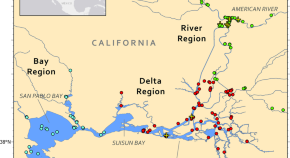
-
Heterogeneous movement by a small non-migratory stream fish
Authors (first, second and last of 4)
- Lucas De Fries
- Mateus Camana
- Fernando Gertum Becker
- Content type: OriginalPaper
- Published: 22 November 2021
- Pages: 1873 - 1885
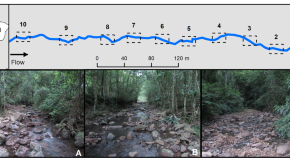
-
Understanding the long-term movement patterns of hatchery-reared white seabass
Authors
- Ruairi MacNamara
- Michael Shane
- Mark Drawbridge
- Content type: OriginalPaper
- Published: 05 November 2021
- Pages: 1797 - 1808

-
Single-species subgroups form within mixed-species shoals of tropical and temperate fishes
Authors
- Kai C. Paijmans
- David J. Booth
- Marian YL. Wong
- Content type: OriginalPaper
- Published: 29 October 2021
- Pages: 1975 - 1988
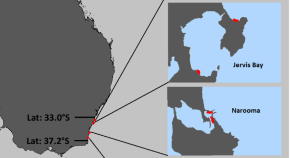
-
Combining acoustic telemetry with a mechanistic model to investigate characteristics unique to successful Atlantic salmon smolt migrants through a standing body of water
Authors (first, second and last of 6)
- Jessie Lilly
- Hannele M. Honkanen
- Colin E. Adams
- Content type: OriginalPaper
- Open Access
- Published: 23 October 2021
- Pages: 2045 - 2063
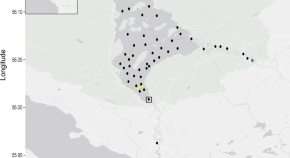
-
Simulating upstream migration and spawning timing effects to allis shad reproductive success
Authors (first, second and last of 5)
- Camille Poulet
- Alexis Paumier
- Patrick Lambert
- Content type: OriginalPaper
- Published: 15 October 2021
- Pages: 2083 - 2097

-
Attraction of an artificial reef: a migratory demersal flounder remains in shallow water under high temperature conditions in summer
Authors (first, second and last of 12)
- Hiromichi Mitamura
- Hideaki Nishizawa
- Masakazu Hori
- Content type: BriefCommunication
- Published: 27 September 2021
- Pages: 1953 - 1962

-
Reverse migration of adult pink salmon (Oncorhynchus gorbuscha) to the sea after their return to fresh water
Authors
- Kentaro Morita
- Content type: OriginalPaper
- Published: 19 August 2021
- Pages: 1825 - 1832

-
Arctic char enter the marine environment before annual ice breakup in the high Arctic
Authors (first, second and last of 7)
- Lars J. Hammer
- Nigel E. Hussey
- Nathan B. Furey
- Content type: BriefCommunication
- Published: 19 May 2021
- Pages: 2017 - 2025
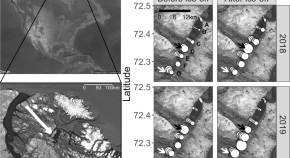
-
Movement patterns of white seabass Atractoscion nobilis tagged along the coast of Baja California, Mexico
Authors (first, second and last of 4)
- Scott A. Aalbers
- Oscar Sosa-Nishizaki
- Chugey A. Sepulveda
- Content type: OriginalPaper
- Published: 30 April 2021
- Pages: 1781 - 1795






